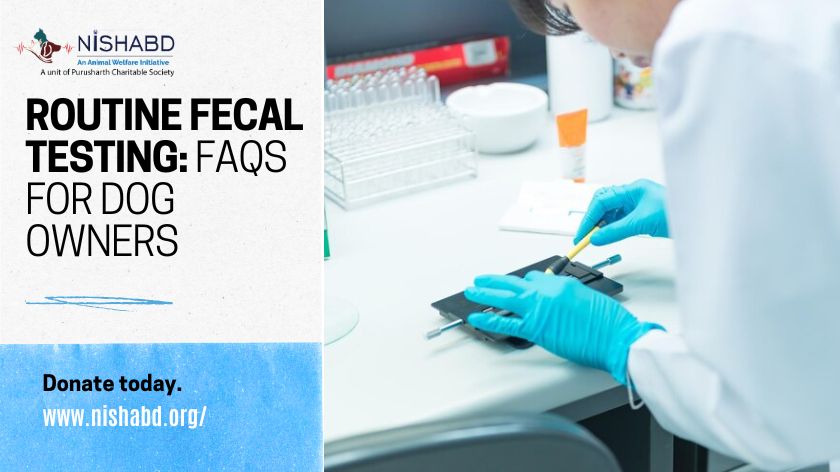Routine Fecal Testing: FAQs for Dog Owners
As a responsible dog owner, it is your obligation to do whatever possible to guarantee the wellbeing and satisfaction of your furry companion. One aspect that is frequently neglected yet very important in pet consideration is routine fecal testing.This blog will address common questions concerning that and will examine the reason why and how it should be done consistently to keep your little pets in the most excellent condition.
What Is Routine Fecal Testing?
Routine waste testing involves looking at your canine’s feces test to examine parasites, microbes and different microorganisms that could pose health threats to their wellbeing. This testing distinguishes infections which probably won’t show immediate side effects yet could become serious health concerns without treatment.
Why Is Routine Fecal Test Significant?
Routine Fecal Test ought to be seen as fundamentally significant:
- Finding Parasites: Dogs can rapidly get parasites in their environment, including roundworms, hookworms, whipworms and tapeworms. These parasites can lead to different medical problems including weight loss, looseness of the bowels and anemia whenever left untreated; some of which might try to transmit from dog to human and therefore should be detected and treated immediately prior to creating additional transmissions.
- Avoiding Health Issues: Fecal testing can assist with identifying minor medical problems before they raise to additional serious ones. By treating parasites and infections almost immediately, parasites and diseases could save your canine from distress as well as more serious medical conditions in the future.
- Ensuring Overall Health: Fecal testing is a piece of keeping up with your dog’s general wellbeing and ought to be viewed as a functioning measure to keep the dog from parasites, guaranteeing longer and more joyful lives for you both.
How Frequently Should Fecal Testing Be Performed?
Veterinarians for the most part suggest performing regular Fecal testing on grown-up dogs no less than once every year. Puppies, nonetheless, ought to have more frequent testing (regularly during their underlying vet visit as they are more susceptible to parasites). Furthermore, dogs who spend lots of time outside such as dog parks or near other animals may require more frequent testing as well.
How Can A Fecal Test Be Conducted?
- Collecting the Sample: The most important phase in Fecal testing is gathering a feces sample. For maximum accuracy, gather fresh samples in no less than 24 hours of testing using a clean plastic bag or container to put the sample in. If this is difficult for you, ask your veterinarian for his assistance or reach them directly for help.
- Deliver Your Sample to the Vet: Whenever you’ve collected your sample, get it to your veterinarian as fast as you can. Ensure it stays in a cool area until your visit in order to limit the degradation that could change its results.
- Analyzing the Sample: At the vet’s office, your sample will be closely examined under a microscope in order to look for signs of parasite eggs, larvae or adult parasites as well as signs of infection by bacteria or any other signs that indicate health concerns in your pet.
What Parasites are Commonly Found in Dogs?
- Roundworms Roundworms are one of the most often tracked down parasites among doggies and can lead to stomach related issues, weight reduction and a terrible pot-bellied appearance in affected pets.
- Hookworms Hookworms connect themselves to the intestinal lining and feed on blood, prompting iron deficiency and weight reduction in pups, who might turn out to be particularly powerless without ideal treatment.
- Whipworms Whipworms dwell in the large intestine and can cause extreme irritation that results in loose bowels and weight reduction, as well as tapeworm perversion through flea bites.
- Tapeworms Tapeworms may likewise be spread via flea bites and can cause stomach related unsettling disturbances as well as irritation around the anus area.
- Giardia and Coccidia Parasites that plague dog’s intestinal tracts might prompt looseness of the bowels and other medical conditions, especially among more youthful or immune compromised pets.
What Symptoms Should I Watch For?
While routine fecal testing is crucial for early detection, you should also be aware of symptoms that might indicate a parasitic infection. These include:
- Diarrhea
- Vomiting
- Weight loss
- Lethargy
- Scooting or rubbing their rear on the ground
- Visible worms or eggs in the stool
If you notice any of these symptoms, contact your vet immediately for further evaluation and treatment.
How are Parasitic Infections Treated?
Treatment for parasitic infections typically involves deworming medications. The type of medication and the duration of treatment depend on the specific parasite and the severity of the infection. Your vet will prescribe the appropriate medication and provide instructions on how to administer it.
In addition to medication, maintaining good hygiene and cleanliness is crucial. This includes regularly cleaning your dog’s living area, picking up feces promptly, and ensuring your dog is on a flea prevention regimen to reduce the risk of tapeworms.
Can Parasitic Infections be Prevented?
While it’s not always possible to prevent parasitic infections entirely, there are steps you can take to reduce the risk:
- Regular Vet Visits:
Ensure your dog has regular check-ups with the vet, including routine fecal testing.
- Good Hygiene Practices:
Keep your dog’s living area clean, pick up feces promptly, and wash your hands thoroughly after handling your dog or cleaning up after them.
- Flea Prevention:
Use flea prevention products to reduce the risk of tapeworm infections.
- Safe Environment:
Avoid letting your dog drink from stagnant water sources, and try to prevent them from eating feces or other potentially contaminated material.
- Regular Deworming
Follow your vet’s recommendations for regular deworming treatments, especially if your dog is frequently outdoors or around other animals.
What Should I Do if My Dog Tests Positive for Parasites?
If your dog tests positive for parasites, follow your vet’s treatment plan closely. This may involve administering medication and possibly follow-up tests to ensure the parasites have been completely eradicated.
|During the treatment period, keep your dog away from other pets and clean up their feces immediately to prevent the spread of parasites. Also, thoroughly clean your home and your dog’s living area to eliminate any remaining eggs or larvae.
- Figuring out the results:
In the wake of getting the results of your dog’s Fecal test, your vet will make sense of what was found and its likely impacts on their health. The following are a couple of potential results:- Negative results: A negative outcome shows no parasites were found in a feces test; be that as it may, regular testing should continue as some parasites may not always appear in every sample.
- Positive Parasite Test: Assuming the parasite test turns positive, your vet will identify and recommend treatment in a like manner to guarantee total eradication. Following your vet’s treatment plan is critical to guarantee its effectiveness in eliminating parasites totally.
- Presence of Microorganisms or Different Issues: A test could likewise identify bacterial diseases or other stomach related issues, and provide guidance from your vet with respect to any fundamental treatment – which could incorporate antimicrobials or diet changes.
The Importance of Communication with Your Vet
Communication Is the Key Communicating openly with your veterinarian is critical to keeping your dog’s health in top condition. Don’t be shy to raise questions or express any concerns you may have regarding their fecal test results or overall wellbeing – your vet is there to guide you through any health issues so they receive the highest-quality care.\
Conclusion
Fecal testing ought to be a necessary part of your dog’s medical care schedule. Fecal tests help identify and treat parasitic diseases early, assisting your little dog with staying sound and blissful. By understanding its importance and making protection helps you in contributing to his wellbeing.
Consider taking an active approach to your dog’s health by going to regular veterinary visits and performing Fecal testing, which could have a gigantic effect over the long time. Remain informed, careful, and help with guaranteeing your furry companion flourishes for the overwhelming many more years to come.

